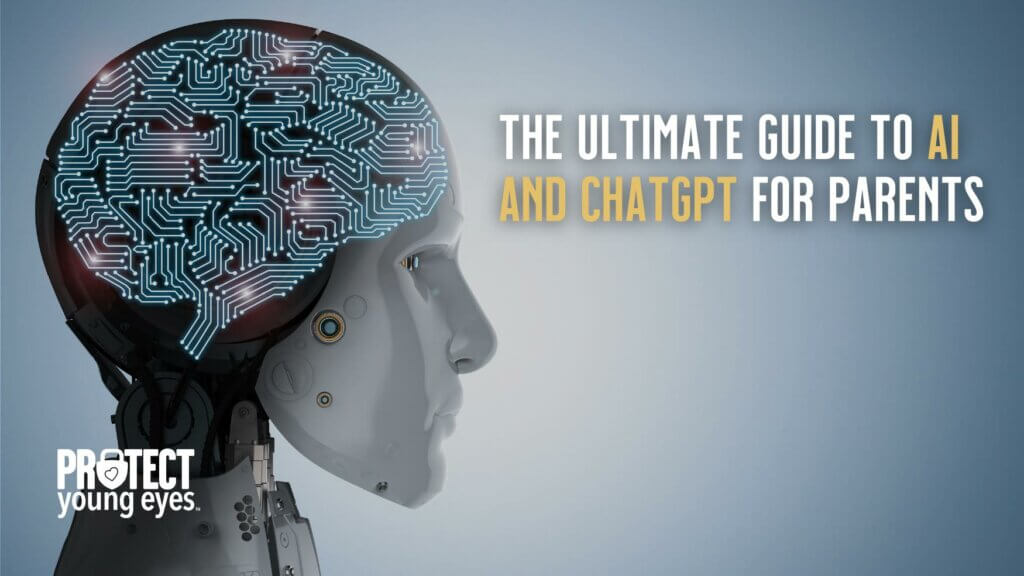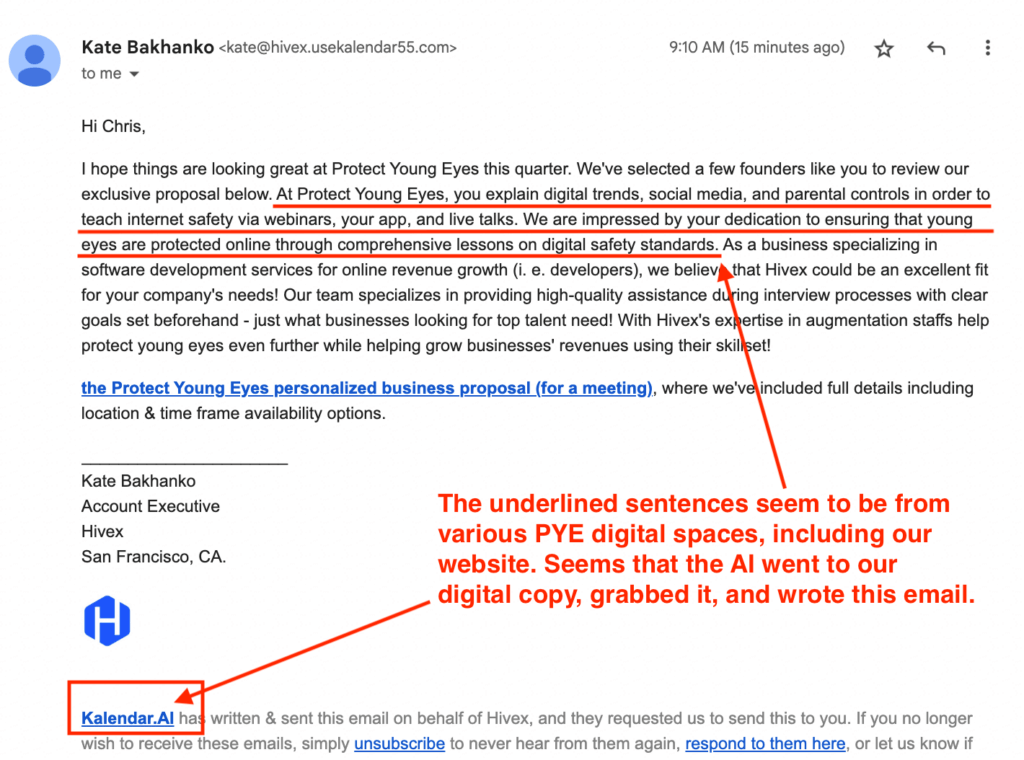Updated 4/3/24
In this article, we will explore everything parents need to know about ChatGPT, and related artificial intelligence (AI) technologies including capabilities, potential uses, and any concerns parents may have about its impact on their children’s learning and development.
ChatGPT is scary good at writing just like us and with blazing speed. This has parents, teachers, and professors really concerned. But is it justified?
What is ChatGPT?
ChatGPT is a language model developed by OpenAI (connected to Microsoft) that has been trained on a large dataset of text data. It uses this training to understand and respond to natural language, making it possible to have more natural and human-like interactions with technology.
ChatGPT is designed to be highly versatile and can be used in a variety of applications, including chatbots, virtual assistants, and language translation. With its ability to understand and respond to natural language, ChatGPT has the potential to revolutionize the way we interact with technology.
While ChatGPT is free, users who want more out of the program can pay $20/month for ChatGPT Plus. This grants subscribers priority during peak hours, faster responses, and early access to new features and improvements.
The ChatGPT App
Open AI also released its chatbot to the App Store (12+) on May 18th, 2023. It has reached over 110M downloads. Now that it doesn’t require an account, password, or email verification – it’s open to everyone, everywhere.
Any digital device that can open up an internet browser or use an app store has access to ChatGPT.
How can ChatGPT be used for good?
ChatGPT can be used in a variety of ways to improve our lives and make tasks more efficient. Some examples include:
- Virtual assistants: ChatGPT can be integrated into virtual assistants, such as Amazon’s Alexa or Google Assistant, to make them more efficient and better able to understand and respond to natural language input.
- Chatbots: ChatGPT can be used to create chatbots that can have natural and human-like conversations with users. This can be useful in customer service, support, and other areas where people need assistance.
- Language Translation: ChatGPT can be used to improve machine translation, making it more accurate and natural-sounding.
- Educational tool: ChatGPT can be used as a tool for teaching languages, and helping students to practice and improve their language skills.
- Content Creation: ChatGPT can be used to generate new content such as this blog post, articles, stories, automated emails, and summaries, that can be used in various industries like journalism, content marketing, and education. Here’s a bit of irony – Massachusetts Senator Barry Finegold (D) used the tool to help write legislation that would create data privacy and security safeguards for the service and others like it.
- Research: ChatGPT can be used to analyze large amounts of text data and extract insights, which can be useful in fields such as market research, sentiment analysis, and text summarization.
This AI-written email was received by PYE Founder, Chris. It’s obvious that the AI studied our website and grabbed a copy from the site to craft the email:
Overall, the ability of ChatGPT to understand and respond to natural language input makes it a versatile tool that can improve efficiency and make tasks more convenient.
How can Teens Abuse Technology like Chat GPT?
ChatGPT, like any technology, can be misused or abused by individuals, including teens. Here are a few ways that teens may abuse ChatGPT:
- Cyberbullying: Teens may use ChatGPT to generate hurtful or abusive messages to send to others online.
- Spreading misinformation: Teens may use ChatGPT to generate fake news or misinformation and spread it online.
- Online fraud: Teens may use ChatGPT to generate phishing emails, scam messages, and impersonate other people to steal personal information or money.
- Cheating: Teens may use ChatGPT to generate answers for homework assignments, tests, or exams, which goes against academic integrity and is cheating.
- Online harassment: Teens may use ChatGPT to generate inappropriate or offensive messages and post them online, which can be hurtful to the target and may lead to serious consequences.
- Privacy Invasion: Teens may use ChatGPT to generate messages that may trick people into sharing personal information, which can be used for malicious purposes.
It’s important for parents and educators to be aware of these risks and to teach teens about the responsible and ethical use of technology. It’s also important for parents to have an open and honest conversation with their teens about the potential risks and consequences of misusing ChatGPT and other AI technologies.
Can ChatGPT be used to Spread Misinformation and Propaganda?
Yes, ChatGPT, like any AI-based technology, can be used to spread misinformation and propaganda. Because ChatGPT is trained on a large dataset of text data, it can generate responses that are similar to the information it has seen in the past. If the training data contains misinformation or propaganda, ChatGPT’s responses may also contain that type of information. Additionally, ChatGPT can be fine-tuned using specific data sets, if this dataset contains misinformation, it will be reflected in the responses of ChatGPT.
One example of how ChatGPT could be used to spread misinformation is through the generation of fake news articles or social media posts. These can be used to influence public opinion or to spread false information. ChatGPT can also be used to create chatbots or virtual assistants that can respond to users with misinformation or propaganda.
However, OpenAI has also developed a tool to help distinguish between human-generated and AI-generated text with a 26% success rate. As more and more AI programs emerge, we might also see more tools designed to keep AI in check.
It’s important to be aware of the potential risks and to use the technology responsibly. It’s also important to fact-check information that comes from AI-based systems and to be skeptical of information that seems too good to be true or that confirms existing biases. It’s crucial for the creators and the users of ChatGPT to have an ethical approach and to use the technology in a responsible way.”
How are Schools Responding to ChatGPT?
- The nation’s largest public school district, New York City Public Schools, initially banned ChatGPT from their schools, but has now unbanned the program stating that “While initial caution was justified, it has now evolved into an exploration and careful examination of this new technology’s power and risks.”
- Los Angeles Unified School District said they want to “protect academic honesty while a risk/benefit assessment is conducted.”
- Chicago Public Schools hasn’t decided and is considering using ChatGPT in classrooms. The Editorial Board of Chicago Tribune believes that ChatGPT has a place in classrooms, but teachers must understand it first.
Obviously, struggling students are far more likely to use ChatGPT, given how easy it would be to cheat. The CEO of ChatGPT thinks schools “need to get over their cheating fears,” which might be true. Maybe teachers will simply need to adopt assessment methods other than writing long papers.
Some teachers have started harnessing its power for their own, lesson-writing benefit. Jake Carr, an English teacher, has been using ChatGPT to create flawed paragraphs of text for students to refine, and instructing the chatbot to write up examples to use in the classroom.
“I’ve come to view ChatGPT and other machine learning as the intern I’ve always wanted,” Carr said. “I shift the heavy lifting to that intern, and finesse what it produces afterward.” – Jack Carr, Teacher
But we agree with a slow adoption until its impacts on education are better understood.
Should Parents Be Afraid of ChatGPT?
No, but parents should be aware of it. ChatGPT and other AI programs have the potential to help and the potential to harm. Regardless, they are probably here to stay. That’s nothing new, all impactful technologies have their pros and cons. It’s about how we use it. Some schools are deciding not to use it at all, others are waiting until we know more. These AI programs are so new, that it’s difficult to assess whether their abilities will be more helpful or harmful to our families.
But we are starting to see signs of both benefit and abuse. For example, we recently raised concerns (Facebook, Instagram) about Snapchat’s My AI and privacy and the slow erosion of real relationships. There are many TikTok videos of kids pretending that the Snapchat AI is their new fake boyfriend, who speaks to them with care.
Or the story of a mother who received an AI-generated voice duplication of her daughter, faking a kidnapping.
We won’t lie, the fact these programs have the power to change the way we do school and life is a bit frightening. But don’t let fear dictate your parenting. When we say, “Talk to your kids about everything,” that’s exactly what we mean. Engage. May your fears lead you to SPEAK and not FREAK.
What if I have more questions about AI? How can I stay up to date?
Two actions you can take!
- Subscribe to our tech trends newsletter, the PYE Download. About every 3 weeks, we’ll share what’s new, what the PYE team is up to, and a message from Chris.
- Ask any AI and deepfake-related questions in our private parent community called The Table! It’s not another Facebook group. No ads, no algorithms, no asterisks (and no AI!). Just honest, critical conversations and deep learning! For parents who want to “go slow” together. Become a member today!
P.S. 12 AI Websites That Will Blow Your Mind:
- Texti.app: Automatically answers your questions as you are searching.
- Poised: Develop public speaking skills.
- AssemblyAI: Turns audio and video files into text.
- StockAI: Create images.
- AI. Image Enlarger: Helps enlarge and enhance photos,
- Sembly: Takes voice recordings and translates them into text.
- Browse AI: Monitors competitors by extracting data from a website and researching.
- Murf.AI: Turns your text into a human-sounding voice, and can be used to create audiobooks.
- Synthesia: From text, this creates VIDEO.
- Super Meme: Make custom Memes!
- Podcastle Ai: Converting text into speech.
- NameLix: Business Name Generator.




So we will have two levels of human intellect.
Those that work to make the AI productive and those that use that use the AI to be productive.
The first will grow by using their brains and the latter will become even more dummified by not using theirs.
I would like to know if the geniouses in Silicone Valley will allow themselves and their children tomuse this.
(No spell and grammar checker here, maybe I should have used AI)